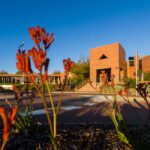Six leading Curtin University researchers have been awarded prestigious Future Fellowships by the Federal Government to carry out research of national and international importance.
The Australian Research Council scheme will support Curtin researchers to investigate sustainable construction, autonomous technologies, the digitisation of on-Country learning, the origins of the solar system, new forms of hydrogen production, and the most energetic particles in the universe.
The successful Curtin recipients include Dr Wensu Chen, from the School of Civil and Mechanical Engineering, Associate Professor Katarina Miljkovic, from the Space Science and Technology Centre in the School of Earth and Planetary Sciences, Professor Kim Scott, from the School of Media, Creative Arts and Social Inquiry, Dr Guohua Jia, from the School of Molecular and Life Sciences, as well as Professor Ba Tuong Vo and Associate Professor Anthony Brown, both from the School of Electrical Engineering, Computing and Mathematical Sciences.
Curtin University Deputy Vice-Chancellor Research Professor Chris Moran congratulated the Curtin recipients of the prestigious fellowships.
“The Australian Research Council’s Future Fellowships are reserved for Australia’s best and brightest researchers, so I am absolutely delighted six Curtin researchers have been awarded this honour,” Professor Moran said.
“This investment will enable these highly qualified researchers to undertake quality research of national and international benefit, covering topics ranging from sustainable construction and how digital technologies can help share Aboriginal heritage to learning more about the most energetic particles in the universe and expanding our understanding of the origins of our solar system.”
Further details about the successful Curtin University projects include:
- Dr Wensu Chen
Multi-hazard resilient hybrid modular structures
Background: This project aims to develop the next generation of multi-hazard resilient modular construction methods for efficient, affordable and sustainable buildings.
- Associate Professor Katarina Miljkovic
Impact craters as probes into planetary crusts and prospect for resources
Background: The project aims to investigate the structure of the Earth’s crust in Australian impact crater sites, impact crater morphologies on Mars, and expand our understanding of the origins of our solar system.
- Professor Ba Tuong Vo
A Bayesian Approach to Distributed Estimation for Multi-Object Systems
Background: This project aims to develop new signal processing techniques that facilitate autonomous technologies for environmental perception, with the ability to efficiently process large data volumes from multiple sensing modalities.
- Professor Kim Scott
Narrative, Technologies and Wirlomin Moorditj-abiny
Background: The project aims to investigate how digital technologies in combination with on-Country camps may consolidate, enhance and help share a specific Aboriginal heritage.
- Dr Guohua Jia
2D nanomaterial heterostructures for photocatalytic hydrogen production
Background: This project aims to develop two-dimensional (2D) nanomaterial heterostructures as photocatalysts for hydrogen production from the liquid carrier of methanol.
- Associate Professor Anthony Brown
Understanding the enigma of the most energetic particles in the universe
Background: This project will study astronomical particle accelerators and dark matter with unprecedented accuracy by combining an innovative UAV-based calibration technique with the unparalleled sensitivity of future gamma-ray and radio telescope arrays.
The ARC Future Fellowships provide four-year fellowships to outstanding Australian mid-career researchers with the aim of expanding knowledge base and research capacity in Australia and providing economic, commercial, environmental, social and cultural benefits for the country.
For more information about the ARC Future Fellowships, visit here.



